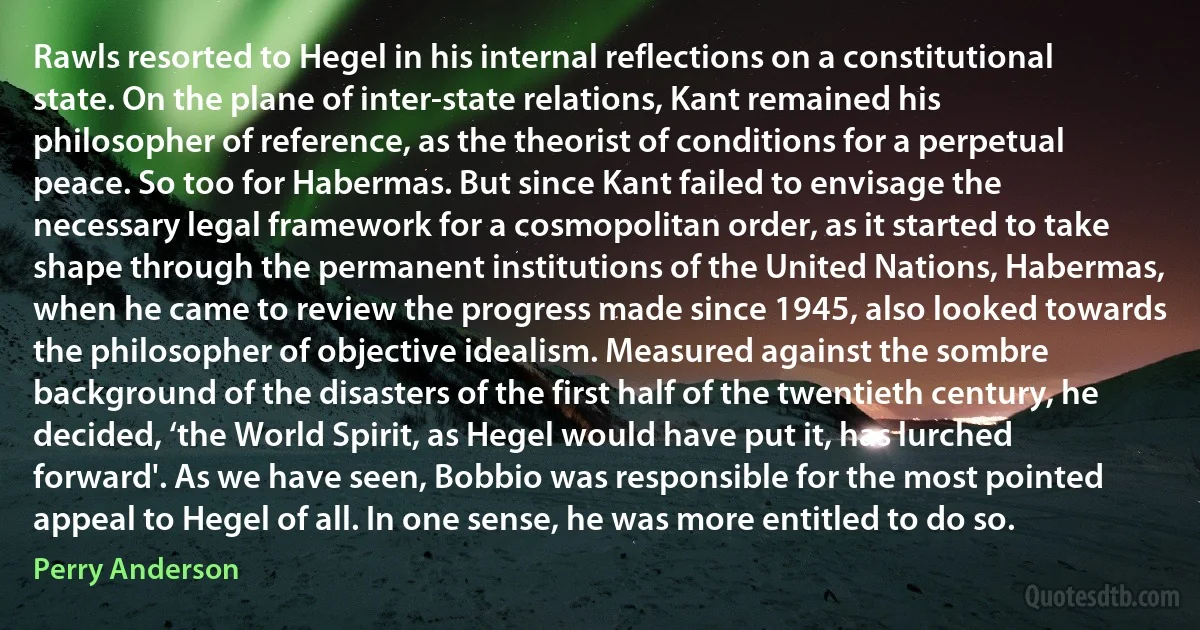
Rawls resorted to Hegel in his internal reflections on a constitutional state. On the plane of inter-state relations, Kant remained his philosopher of reference, as the theorist of conditions for a perpetual peace. So too for Habermas. But since Kant failed to envisage the necessary legal framework for a cosmopolitan order, as it started to take shape through the permanent institutions of the United Nations, Habermas, when he came to review the progress made since 1945, also looked towards the philosopher of objective idealism. Measured against the sombre background of the disasters of the first half of the twentieth century, he decided, ‘the World Spirit, as Hegel would have put it, has lurched forward'. As we have seen, Bobbio was responsible for the most pointed appeal to Hegel of all. In one sense, he was more entitled to do so.
Perry AndersonRelated topics
came century constitutional cosmopolitan forward half idealism necessary objective order peace plane review seen sense sombre spirit state take theorist world relations kant hegelRelated quotes
I came to understand why animals have horns. It was the incomprehensibility that could not be contained within their lives, a wild and obsessive caprice, their ill-judged and blind obstinacy. Some idée fixe-grown beyond the borders of their being and high above their heads, suddenly brought into the light-had solidified into palpable, hard matter. There, it had assumed its wild, incalculable, and incredible shape, twisted into a fantastical arabesque, invisible to their eyes, but dreadful nonetheless, the unknown numeral under whose menace they lived. I understood why those animals were disposed to ill-judged and wild panic, to startled frenzy. Herded into their mania, they could not extricate themselves from the knot of those horns, and so, lowering their heads, they looked out sadly and wildly from between them as if trying to find a pathway through their branches.

Bruno Schulz
The issues raised in the historic conflict between Charles I, resting his claim to govern Britain on the divine right of kings, and Parliament - representing, however imperfectly, a demand for the wider sharing of power - concerned the use and abuse of state power, the right of the governed to a say in their government, and the nature of political freedom. The Levellers grew out of this conflict. They represented the aspirations of working people who suffered under the persecution of kings, landowners and the priestly class, and they spoke for those who experienced the hardships of poverty and deprivation. They developed and campaigned, first with Cromwell and then against him, for a political and constitutional settlement of the civil war which would embody principles of political freedom, anticipating by a century and a half the ideas of the American and French revolutions.

Tony Benn
For The United States, the leading space faring nation for nearly half a century, to be without carriage to low Earth orbit and with no human exploration capability to go beyond Earth orbit for an indeterminate time into the future, destines our nation to become one of second or even third rate stature. While the President's plan envisages humans traveling away from Earth and perhaps toward Mars at some time in the future, the lack of developed rockets and spacecraft will assure that ability will not be available for many years.
Without the skill and experience that actual spacecraft operation provides, the USA is far too likely to be on a long downhill slide to mediocrity. America must decide if it wishes to remain a leader in space. If it does, we should institute a program which will give us the very best chance of achieving that goal.

Neil Armstrong
A review of our party's seventy-plus-year history elicits an important conclusion. Our party earned the people's support during the historical periods of revolution, construction and reform because it always represented the requirements for developing China's advanced productive forces, the orientation of China's advanced culture and the fundamental interests of the overwhelming majority of the Chinese people. The party also earned popular support because it fought tirelessly to realize the fundamental interests of the country and the people by formulating a correct line, principles and policies. Today, humanity once again stands at the beginning of a new century and a new millennium. How our party can better effectuate the Three Represents under the new historical conditions is a major issue all Party comrades, especially high-ranking party cadres, must consider deeply.

Jiang Zemin
When rent in twain, British Abolition, which in fanaticism and sacrificial spirit, far exceeds that of the North (for it has been willing to pay for its fanaticism, a thing the North never will do), will have none of the impediments in its path, now to be found. England will no longer fear the power of the mighty nation which twice has humbled her, and whose giant arm would, so long as we are united, be stretched forth to protect the weakest State, or the most obscure citizen. The State that secedes, when pressed by insidious arts of abolition emissaries, supported by foreign powers, when cursed by internal disorders and insurrections, can lay no claim to that national flag, which when now unfurled, ensures the respect of all nations and strikes terror to the hearts of those who would invade our rights.

Sam Houston
